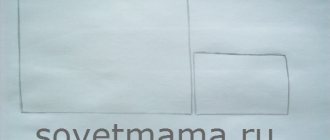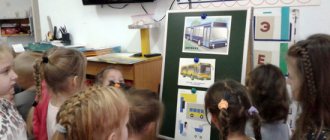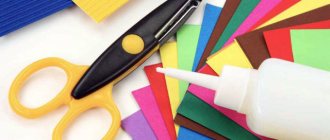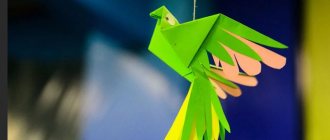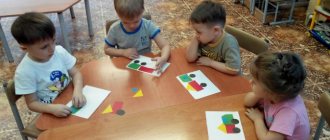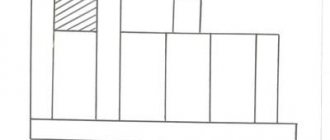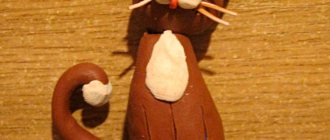MAGAZINE Preschooler.RF
Summary of a design lesson in a multi-age group “Truck”Goal: developing the ability to create an object from a TIKO constructor in accordance with the diagram.
Objectives: Educational: to develop the ability to correlate a real object with a diagram. Introduce the plan of analysis of both the subject itself and its schematic representation.
Educational: Cultivate accuracy in work, strive for results. Develop the ability to not interfere with your friend while building a car. Instill in children responsibility for their own safety; street culture.
Developmental. To develop in children the ability to read diagrams, to determine from the diagram what building parts the machine is built from. Develop skills in constructing statements and reasoning.
Methodical techniques:
- visual
- verbal
- practical
- problem-search
- encouragement
Material: handout: TIKO designer parts, diagrams.
Progress of the lesson.
1. Educator: Guys, look, we have guests today, let’s say hello to them.
Educator: who else came to visit us? slide 1
Children: Masha.
-Teacher: Guys, Grandma decided to move to a new house and asked Masha to help her, but Masha doesn’t know how to transport things and furniture.
- Shall we help Masha move her things?
-What do you guys think, what can you use to transport things and furniture?
(Truck)
- Look at the screen, which of these cars can you transport things on? slide 2
-Name the cars (car, concrete mixer, motorcycle, school bus)
- Guys, we don’t have a truck, what should we do? Children: (build).
— What can you build a truck from? (from constructor)
-Why is it called cargo? (Transports various cargoes)
Let's take a look at the truck! (children examine the structure of building parts, identify the main functional parts in it, determine their spatial position, size and shape). slide 3
— Tell me, guys, what is the name of the front part of the truck? (driver's cabin).
— Which part of the machine is the heavy load loaded into? (into the body)
-Which part of the truck was not named? (wheels)
— What kind of cargo do you think trucks can transport? (boards, logs, bricks, potatoes, etc.) In a word, everything that is heavier.
— Guys, I propose to make a truck from a TIKO construction set.
-I have a picture - a diagram according to which you can build exactly the same truck. slide 4
-What parts is the truck cabin made of? (3 squares and 1 triangle)
— What parts is the truck body made of? (Rectangle)
- And this geometric figure is new to you, it’s called a pentagon.
-Why do they call her that? (5 corners)
PHYSICAL MINUTE “Be careful”
We are driving, we are driving a car, they imitate the movements of the steering wheel.
We press the pedal. The leg is bent and extended.
We turn on the gas, turn it off, turn the imaginary lever with your hand towards you, away from you.
We look intently into the distance and put our palm to our forehead.
The wipers clean off the drops. Hands are bent at the elbows in front of you, palms
reveal.
Right left. Purity! Tilt your arms left and right.
The wind ruffles my hair. They move their fingers above their heads.
We are drivers anywhere! Raise your thumb up.
- Well done. Now go to the tables and build a truck according to this scheme. We begin to work according to the scheme, all the details are in front of you.
— I want to draw your attention to the fact that the cars can be multi-colored, but the geometric shapes must match the diagram.
(Children's independent work).
- Well done boys! How many beautiful trucks did you get: each one has its own, just like in the picture. You completed the task. Masha understood which car should be used to transport her grandmother’s things.
— Guys, look at the screen slide 5
Masha says: Thank you very much for your help and goodbye.
Educator: Guys, what did you do today? What did you like most?
(We built a truck according to the diagram)
-Do you like the cars you made?
- Guys, what are you in the mood? (cheerful, joyful, happy)
Educator: Well done, thank you.
| Next > |
Class on CT (design) for children of middle preschool age in the “Bus for Friends” group.
Target:
teach children to make an image of a bus from ready-made parts (windows, doors, wheels).
To develop their skills in folding a sheet of paper in half, aligning the sides and corners.
Strengthen the ability to glue paper parts (windows, doors, wheels) to a reference line.
Develop eye, clarity of hand movements, attention.
To instill accuracy in work in preschoolers.
Preliminary work: examination of the observation album “Buses”. Learning the song “Blue Bus”.
Materials for each child: bus body blank (sheet of cardboard with cut corners), 5 squares (windows), 2 strips (bus dividing strip), 2 short strips (doors), 2 triangles (front windows), 4 circles (wheels) , glue stick, napkins, cut out animal figures.
Contents of direct educational activities:
Children sit on modules. There's a knock on the door. The postman comes and brings a letter.
Educator: - Guys, we have a letter. Let's see who it's from. It was the inhabitants of the forest who sent us a letter. They really want to come to us for the Autumn holiday, but no transport goes to their forest. They ask us to help them get to our kindergarten. Shall we help?
-Guys, let's think about what types of transport you know? Children's answers: plane, helicopter, car, etc.
-Well done guys, you know many types of transport. But the animals wrote a clue in a letter to us:
What kind of miracle is the long house?
There are a lot of passengers in it
Wears rubber shoes
And it runs on gasoline.
(Bus) .
— That’s right, guys, this is a bus (the teacher takes a large paper bus out of the envelope). How can we help animals? I only have one bus, but there are many residents.
Children's answers: make more buses.
-What a great idea, let's make buses.
But first, let's look at the bus. What parts does the bus consist of? Children's answers: body, windows, doors, wheels. Where are they located?
Right. Now we will sit down at the tables. Each of you has blanks of bus parts. Let's look at them and try to put everything in its place. What will we make the body from (from a large sheet of cardboard). That's right, we need to bend it in half. So that the sides and corners touch each other.
-What shape will we make wheels from? (circles) how many are there? (4)
-Why do you think you have two long stripes? Right. To divide each side of the bus into two equal parts - in half.
-What are two short stripes for? (doors)
-What geometric shapes will you make windows from? (squares and triangles).
-What will serve as wheels for us? (circles). The wheels on both sides are at the same distance opposite each other. Pair.
Please note that on one side the bus has doors, but on the other there are no doors.
So we laid out the parts of the bus. Now let's secure it all with glue.
Educator: Guys, there are still images of animals in the envelope. Let's put every animal on the bus. Children stick pictures on bus windows.
-What a great fellow you are, you made wonderful buses. Let's play with them.
Game "Traffic lights and cars"
— Guys, you did a very useful thing today. You helped the animals get to the Autumn festival in our garden. Tell me, did you like designing buses? Well done.
The animals are very grateful to you and give you treats (juice) for this.
Author: Franchuk Tatyana Valentinovna
LEGO construction in the middle group on the topic: “Cars for residents of the flower city”
Consultation for parents “ LEGO
construction in early preschool age”
Modern children live in an era of active informatization, computerization and robotics. Technical achievements are increasingly penetrating all spheres of human life and arousing children’s interest in modern technology.
Thanks to the developments of the LEGO company, at the present stage it is possible to introduce children to the basics of the structure of technical objects already at preschool age. From birth, children have an inherent desire to explore the world around them. It is known that children learn best through play. During the game, conditions are created that allow the child to independently build a system of relationships with peers and adults.
In kindergarten, this method of teaching is traditionally one of the main ones.
Currently, our preschool institution widely uses LEGO teaching aids.
Play is the most important companion of childhood. And LEGO allows you to learn through play and learn through play.
LEGO sets have proven themselves throughout the world as educational products that meet the highest demands for hygiene, aesthetics, strength and durability. Due to their pedagogical versatility, they turn out to be the most preferred visual aids and educational toys. Moreover, this designer encourages both the baby’s head and hands to work equally.
LEGO construction sets represent a variety of thematic series, designed on the basis of basic building elements - multi-colored LEGO bricks. In addition, LEGO is not an easy toy; it teaches and develops a child. If you put together one toy, you’re tired of it, turn on your imagination and put together a new one, using only your own mind and ingenuity!
The LEGO DUPLO constructor is not a simple toy, it is an educational game that was created to help a child learn about the adult world around him in the best possible way. The LEGO DUPLO construction set promotes the development of a child's thinking and imagination, and promotes the development of creative potential at a very early age. Very popular among young children are such LEGO DUPLO construction sets as an airport, a fire station, a police station, a circus, a zoo, a farm, a castle and much, much more.
Starting with simple figures, the child moves further and further, and, seeing his successes, he becomes more self-confident and moves on to the next, more complex stage of learning.
When creating a building from LEGO, children not only learn to build, but also choose the correct sequence of actions, connection techniques, combination of shapes and colors and proportions.
Playing
LEGO
kids:
- Develop fine motor skills of the hands, stimulating general speech development and mental abilities in the future;
- Learn to navigate space correctly and quickly;
- Gain mathematical knowledge about counting, shape, proportion, symmetry;
- Expand their ideas about the world around them - about architecture, transport, landscape;
- Develop attention, ability to concentrate, memory, thinking;
- They learn to imagine, fantasize, and think creatively;
- They master the ability to mentally divide an object into its component parts and assemble a whole from the parts;
- They learn to communicate with each other, organize joint games, and respect their own and other people’s work.
Working with construction sets allows children, in the form of educational play, to learn a lot of important things and develop skills necessary for later life.
There are three main types of design: by model, by conditions and by design.
Design from a model - when there is a ready-made model of what needs to be built (for example, an image or diagram of a house).
When designing according to conditions, there is no sample, only the conditions that the building must meet are set (for example, a house for a dog should be small, and for a horse - large).
Design by design assumes that the child himself, without any external restrictions, will create an image of the future structure and embody it in the material that is at his disposal. This type of construction develops the child’s creative abilities better than others.
The LEGO DUPLO series of children's construction sets is designed specifically for children aged 2 years and older. This series is characteristically different from other thematic series of LEGO children's construction sets. LEGO DUPLO sets have major building elements that are significantly larger than other sets and do not contain small parts or accessories. What is done specifically to prevent small parts from getting into the child’s respiratory tract. Therefore, the creators and developers of LEGO DUPLO made sure that the child would not be able to swallow the construction elements, but he would be able to chew them thoroughly. Even here, parents do not have to worry too much, since all the parts of the toys are made from environmentally friendly materials.
So, LEGO construction and robotics make it possible to introduce information technologies into the educational process of a preschool institution, helping preschoolers master the elements of computer literacy, skills and abilities to work with modern technical means.
The development of design abilities activates the child’s thought processes, gives rise to interest in the creative solution of assigned problems, ingenuity and independence, initiative, the desire to search for something new and original, and therefore contributes to the development of talent.
GBOU secondary school No. 2 s. Volga region
JV "Kindergarten "Scarlet Flower"
Plan – outline of organized educational activities
on
LEGO design in the middle group
on the topic: “Cars for residents of the flower city”
Educator:
Arbuzova E.A.
2018
Outline
on organized educational activities on
LEGO construction in the middle group
on the topic: “Cars for residents of the flower city”
.
Purpose of the lesson:
continue to develop children’s ability to convey a real resemblance to the car shown on the card using LEGO construction parts.
Integration of educational areas:
artistic and aesthetic development, speech development, physical development.
Tasks:
educational
: develop the ability to analyze a sample machine using a card and select the appropriate parts. Activate speech: naming details, various types of equipment, learn to express an attitude towards your buildings, give them a basic assessment, determine its practical purpose.
developing
: develop memory, attention, imagination, spatial orientation, the ability to creatively play with a building
educational
: cultivate friendly relationships, mutual assistance, accuracy.
Methods and techniques:
practical:
building from a car designer, completing tasks in a workbook.
visual:
demonstration method, illustration method - look at images on a card, individual display.
verbal:
story, explanation, questions for children, individual explanations.
Materials and equipment:
model of the Flower City, LEGO construction sets for each child, drawings of cars - cards for each child, toys for playing with - residents of the Flower City, audio recording, laptop.
Forms of organizing joint activities
| Children's activities | Forms and methods of organizing joint activities |
| Motor | Physical education minute. |
| Gaming | Game situations, constructive games. |
| Construction | Modeling using cards, constructive games. |
| Cognitive - research | Solving a problem situation, modeling. |
| Communicative | Conversations, speech situations, questions. |
| Musical | Completing the task with musical accompaniment. |
Logic of educational activities.
| № p/p | Activities of a teacher | Children's activities | Expected Result |
| 1 | I turn on the music from “The Tale of Dunno” quietly and gather the children near the model of the Flower City. — Guys, you and I have visited the residents of the Flower City more than once. Who lives in this city? — Every day this city becomes bigger and more beautiful. Tall buildings and wide streets appear here. Wonderful mechanics live in this city - Vintik and Shpuntik. -What did they invent? — Residents of the city really liked the idea of driving a car to visit, or transporting heavy loads, because short people are very small. But the problem is that there are many residents, but only one car. Vintik and Shpuntik do not have time to make cars for the city residents, and they turn to you for help. They know that there are wonderful designers in our group. - Do you think we can help our little ones? To help, they sent cards with pictures of the cars that short people dream of. | Children gather around the model and listen to the teacher. Answer questions in complete sentences. - Dunno and his short friends. -A car. - Yes, we will help you make cars. | They accept the game situation and volunteer to help Vintik and Shpuntik. Answer questions. They understand the goal. |
| 2 | — Our mechanics are very responsible and careful people, they like cars to be strong and correctly assembled, so before they start assembling their cars, they want to check how attentive you are and whether you can identify vehicles. | Children sit on chairs and complete tasks in their workbook. | Children recognize and name various vehicles, complete tasks according to the teacher’s instructions in the workbook. |
| 3 | Physical school | They knock fist on fist, raise their hands up, point at each other. While speaking the text. | They perform the movements and recite the text of the physical education lesson. |
| 4 5 | — You did an excellent job with the tasks of Vintik and Shpuntik and now, finally, we can start assembling the machines. I draw your attention to the board where cards with pictures of cars are displayed. — Each of you will have your own car. I suggest you choose yourself. -Look at your card, think about what parts you will use, why this machine will be useful for the short ones. - Now you can start doing the work. Our little ones are looking forward to wonderful cars - helpers - appearing in their city. While the children are working, I turn on the music “Dunno - Shorties” from the cartoon “About Dunno and His Friends.” During children’s independent work, the teacher provides individual assistance with advice, questions, pointing out their details, and matching them with a card. | Children choose a card, analyze a sample car using the card and select the corresponding parts, and tell the sequence of actions. Independent activity of children. | They independently choose a design, analyze a sample, and build a machine. Tell the sequence of actions. The design conveys a real resemblance to the image on the card. |
| 6 | - Guys! The residents of Flower City are grateful for your help and thank you for the wonderful cars! When children play, I turn on music. | Children collect the cars and play with them at the model of the Flower City. They say goodbye to the residents of the Flower City. | The ability to make buildings from construction kits has been developed. They express an emotional attitude towards their buildings. |
